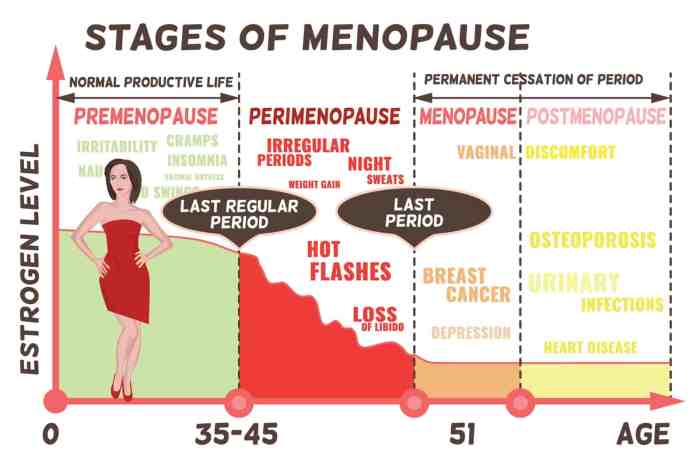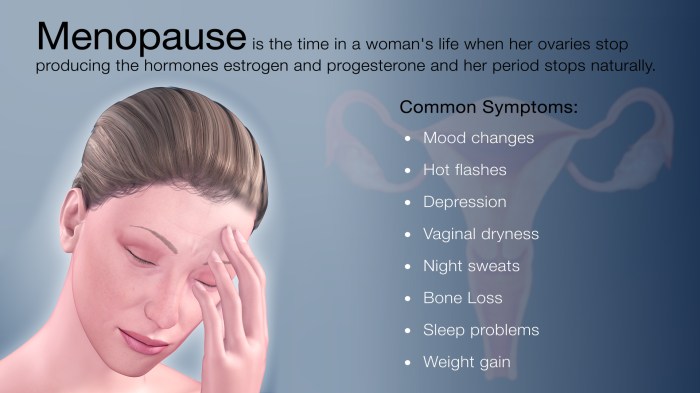Meghan is showing initial signs of menopause – Meghan Markle’s recent disclosure of experiencing initial signs of menopause has sparked widespread attention, shedding light on a topic often shrouded in silence. This article delves into the intricacies of menopause, exploring its hormonal underpinnings, physical manifestations, emotional impact, and available treatment options.
As women transition into this new phase of life, understanding the changes their bodies undergo is crucial. By providing a comprehensive overview of menopause, we aim to empower individuals to navigate this journey with knowledge and support.
Definition of Menopause and Initial Signs

Menopause is a natural transition in a woman’s life that marks the end of her reproductive years. It typically occurs between the ages of 45 and 55 and is characterized by a gradual decline in the production of the hormones estrogen and progesterone.
The initial signs of menopause can vary from woman to woman, but some common symptoms include:
- Irregular periods
- Hot flashes
- Night sweats
- Sleep disturbances
- Mood swings
- Vaginal dryness
Hormonal Changes during Menopause, Meghan is showing initial signs of menopause
During menopause, the ovaries gradually stop producing estrogen and progesterone. These hormones play a crucial role in regulating the menstrual cycle, fertility, and various bodily functions. The decline in estrogen levels can lead to a number of symptoms, including:
- Hot flashes
- Night sweats
- Vaginal dryness
- Osteoporosis
- Increased risk of heart disease
The decline in progesterone levels can also contribute to mood swings, anxiety, and sleep disturbances.
Physical Effects of Menopause
The physical effects of menopause can range from mild to severe. Some women experience only a few minor symptoms, while others may find that their quality of life is significantly impacted. Common physical effects of menopause include:
- Hot flashes
- Night sweats
- Sleep disturbances
- Vaginal dryness
- Osteoporosis
- Increased risk of heart disease
Hot flashes are one of the most common physical effects of menopause. They are characterized by a sudden feeling of heat that spreads over the face, neck, and chest. Hot flashes can be accompanied by sweating, flushing, and a rapid heart rate.
Night sweats are similar to hot flashes, but they occur at night and can disrupt sleep.
Vaginal dryness is another common physical effect of menopause. It occurs due to a decrease in estrogen levels, which can cause the vaginal tissues to become thinner and less elastic. Vaginal dryness can make intercourse painful and can also increase the risk of urinary tract infections.
Osteoporosis is a condition that causes bones to become weak and brittle. It is a common problem for women after menopause because estrogen helps to protect bones from breaking down. Osteoporosis can lead to fractures, which can be painful and debilitating.
Emotional and Psychological Effects of Menopause
The emotional and psychological effects of menopause can be just as significant as the physical effects. Some women experience mood swings, anxiety, and depression during menopause. These changes can be attributed to the decline in estrogen and progesterone levels, which can affect the brain’s chemistry.
Mood swings are a common emotional effect of menopause. They can range from mild irritability to severe mood swings that interfere with daily life. Anxiety is another common emotional effect of menopause. It can manifest as a general feeling of nervousness or worry, or it can be more severe, leading to panic attacks.
Depression is a serious emotional effect of menopause that can significantly impact a woman’s quality of life. It can cause feelings of sadness, hopelessness, and worthlessness. Depression can also lead to difficulty sleeping, eating, and concentrating.
Essential Questionnaire: Meghan Is Showing Initial Signs Of Menopause
What are the initial signs of menopause?
Common initial signs include hot flashes, night sweats, sleep disturbances, vaginal dryness, and mood changes.
How do hormonal changes affect menopause?
Menopause is characterized by a decline in estrogen and progesterone levels, which can lead to a range of physical and emotional symptoms.
What treatment options are available for menopause symptoms?
Treatment options include hormone replacement therapy, lifestyle modifications such as diet and exercise, and alternative therapies like acupuncture and herbal remedies.

